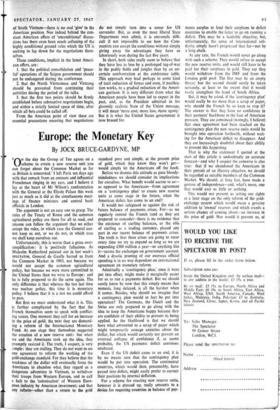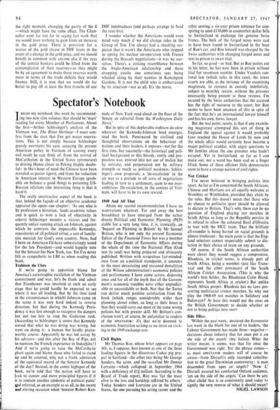Europe: the Monetary Key
By JOCK BRUCE-GARDYNE, MP
N the day the Group of Ten agrees on a
scheme to create a new reserve unit you can forget about the Common Market as far as Britain is concerned.' I left Paris ten days ago with that remark from an eminent and influential Frenchman ringing in my ears, and I believe it lay at the heart of Mr Wilson's confrontation with the General at the Elysee Palace this week just as much as it did at the simultaneous meet- ings of finance ministers and central bank officials in London.
The argument is not an easy one to grasp. The rules of the Treaty of Rome and the common agricultural policy are there for all to read, and anyone can follow the argument that we either accept the rules, in which case the General can- not keep us out, or we do not, in which case we shall keep ourselves out.
Unfortunately, this is worse than a gross over- simplification: it is positively fallacious. As Malcolm Rutherford pointed out in last week's SPECTATOR, General de Gaulle barred us from the Common Market in 1963, not because we would not accept the common agricultural policy, but because we were more committed to the United States than we were to Europe: and he is fully prepared to do the same again. The only difference is that whereas the test last time was nuclear policy, this time it is monetary policy. I believe that it is a test we could afford to pass.
But first we must understand what it is. This is further complicated by the fact that the French themselves seem to speak with conflict- ing voices. One moment they call for an increase in the price of gold; the next they are demand- ing a reform of the International Monetary Fund. At one stage they themselves suggested the creation of a new reserve unit: but when we and the Americans took up the idea, they promptly resisted it. The truth, I suspect, is very simple: they are stalling. They do not want to see any agreement to reform the working of the gold-exchange standard. For they believe that the weakness of the dollar will eventually force the Americans to abandon what, they regard as a dangerous adventure in Vietnam, to withdraw their troops from Western Europe, and to call a halt to the 'colonisation' of Western Euro- pean industry by American investment; and that any reform—other than a return to the gold standard pure and simple, at the present price of gold, which they know they won't get— would simply let the Americans off the hook.
Before we dismiss this attitude as pure bloody- mindedness we should consider its implications for ourselves. What benefit would accrue to
us—
as opposed to the Americans—from agreement on a 'contingency plan' to create new reserve units at some stage in the future, when the American deficit has come to an end?
It would not safeguard us against the risk of future balance of payments crises. For—as we regularly remind the French (and as they are prepared to concede)—there is no evidence that the existence of sterling balances, or the role of sterling as a trading currency, played any part in our recent balance of payments crises. The truth is that these crises are going to recur every time we try to expand so long as we are expending £500 million a year—or anything like it—across the exchanges on government account. And a drastic pruning of our overseas official spending is in no way dependent on international agreement on monetary reform.
Admittedly a 'contingency plan,' once it were put into effect, might make it marginally easier for us to run a payments deficit. But we should surely know by now that this simply means that nemesis, long delayed, is all the harsher when it comes. Besides, why should we imagine that a contingency plan would in fact be put into operation? The Germans, the Dutch and the Swiss are only prepared to go along with the idea to keep the Americans happy because they are confident of their ability to prevent its being applied. So the likelihood is that we should have what amounted to a scrap of paper which might temporarily assuage anxieties about the dollar, but which would certainly not prevent an eventual collapse of confidence if, as seems probable, the US payments deficit continues unabated.
Even if the US deficit came to an end, it is by no means sure that the contingency plan would be put into operation. The continental countries, which would then, presumably, have passed into- deficit, might easily prefer to correct their positions by internal deflation.
For a scheme for creating new reserve units, however it is dressed up, really amounts to a device for requiring countries in balance of pay- ments surplus to lend their surpluses to deficit countries to enable the latter to go on running a deficit. This may be a laudable objective, but, unfortunately, the sense of international soli- darity simply hasn't progressed that far—not by a long chalk.
At any rate, the French would never go along with such a scheme. They would refuse to accept the new reserve units, and would still have to be paid for their surpluses in gold. They say they would withdraw from the IMF and from the
London gold pool. The first may be an empty threat; but the second should surely be taken seriously, at least to the extent that it would vastly strengthen the hand of South Africa.
But, it may be asked, if the 'contingency plan' would really be no more than a scrap of paper, why should the French be so keen to stop it?
The answer is that they have no confidence in their partners' backbone in the face of American pressure. They are convinced (wrongly, I believe) that once agreement had been reached on the contingency plan the new reserve units would be brought into operation forthwith, without wait- ing for the American deficit to disappear. And they are increasingly doubtful about their ability to prevent this happening.
That is why the statement I quoted at the start of this article is undoubtedly an accurate forecast—and why I suspect the converse is also true: that if we abandoned the Americans in their pursuit of an illusory objective, we should be regarded as suitable members of the Common Market. We should, at long last, have made a gesture of independence—and. what's more, one that would cost us little or nothing.
This would not prevent us setting our sights at a later stage on the only reform of the gold- exchange system which would mean a genuine addition to 'owned' reserves and which stands a serious chance of coming about—an increase in the price of gold. Nor would it prevent us, at the right moment, changing the parity of the £ —which might have the same effect. The Chan- cellor went far too far in saying last week that we would have nothing to gain from an increase in the gold price. There is provision for a waiver of the gold clause in IMF loans in the event of a change in the gold price, and we should benefit in common with anyone else if the eyes of the central bankers could be lifted from the contemplation of their reserves—as they might be by an agreement to make those reserves worth more in terms of the trade deficits they would finance. Still, it is true that we would do far better to pay off at least the first tranche of our IMF indebtedness (and perhaps arrange to fund the rest) first.
I wonder whether the Americans would even mind very much if we did change sides in the Group of Ten. I've always had a sneaking sus- picion that it wasn't the Americans who stopped us opting for nuclear co-operation with France during the Brussels negotiations—it was we our- selves. There's a striking resemblance between the Anglo-American relationship and those strapping youths one sometimes sees being wheeled along by their nannies in Kensington Gardens. It is not the child who is embarrassed by its situation—not at all. It's the nurse.



































 Previous page
Previous page